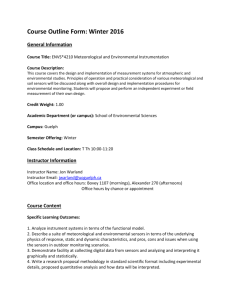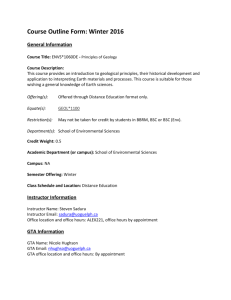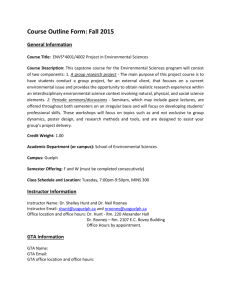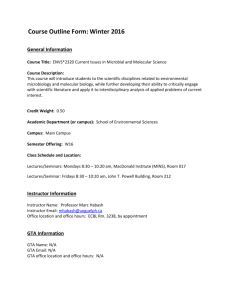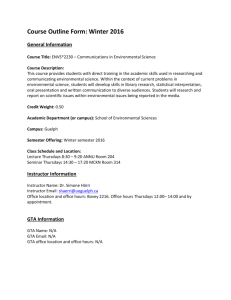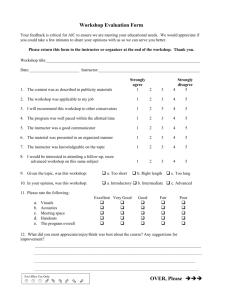Course Title: ENVS*3030 Conservation Field
advertisement
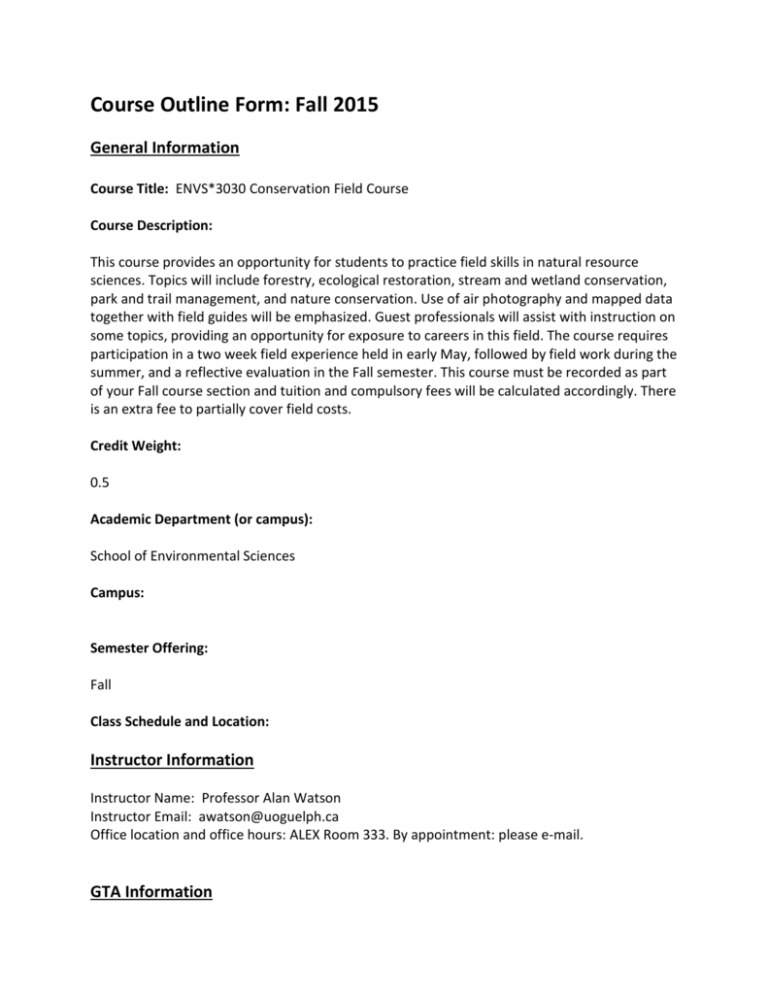
Course Outline Form: Fall 2015 General Information Course Title: ENVS*3030 Conservation Field Course Course Description: This course provides an opportunity for students to practice field skills in natural resource sciences. Topics will include forestry, ecological restoration, stream and wetland conservation, park and trail management, and nature conservation. Use of air photography and mapped data together with field guides will be emphasized. Guest professionals will assist with instruction on some topics, providing an opportunity for exposure to careers in this field. The course requires participation in a two week field experience held in early May, followed by field work during the summer, and a reflective evaluation in the Fall semester. This course must be recorded as part of your Fall course section and tuition and compulsory fees will be calculated accordingly. There is an extra fee to partially cover field costs. Credit Weight: 0.5 Academic Department (or campus): School of Environmental Sciences Campus: Semester Offering: Fall Class Schedule and Location: Instructor Information Instructor Name: Professor Alan Watson Instructor Email: awatson@uoguelph.ca Office location and office hours: ALEX Room 333. By appointment: please e-mail. GTA Information No GTA Course Content Specific Learning Outcomes: 1. The student will write field notes related to field work experiences. 2. The student will communicate with conservation and resource management professionals. 3. The student will recognize the relationship between ecological conservation and biodiversity. 4. The student will demonstrate the ability to make field observations and clearly describe field experiences. 5. The student will carry out an abiotic and biotic inventory of all of the field work locations. 6. The student will use their newly developed perspective on conservation and resource management strategies in a self-directed volunteer field study experience. 7. The student will evaluate the effectiveness of resource management strategies at the private, institutional, municipal, provincial and federal levels. 8. The student will create academic and career-related perspectives on conservation and resource management. Lecture Content: Labs: Seminars: Course Assignments and Tests: Assignment or Test Due Date May 29 Contribution to Final Mark (%) 50 Learning Outcomes Assessed 1, 2, 4, 5, 8 Field Notes Field and Volunteer Experiences: Conceptualization and Action September 18 50 2, 3, 6, 7, 8 Assignment or Test Due Date Contribution to Final Mark (%) Learning Outcomes Assessed Additional Notes (if required): Final examination date and time: No Final examination Final exam weighting: Course Resources Required Texts: Recommended Texts: Lab Manual: Other Resources: Field Trips: CONSERVATION FIELD COURSE (FALL 2015): APRIL 27 to MAY 08, 2015 WEEK 1: APRIL 27 – MAY 01 Monday Tuesday Wednesday Thursday Friday Apr. 27 Apr. 28 Apr. 29 Apr, 30 May 01 9:00AM AM Room 339 Alexander Hall 9:00am Introductions Overview Course assignments Field Trips Equipment Safety Vehicles Money collection Arboretum. Sean Fox, Horticulturist: – Gene Bank; Exsitu Conservation; Elm Recovery Project; Collection Management AM 9:00am – 12:00pm Little Tract Agreement Forest. Wellington County http://www.ontario.c a/rural-andnorth/forestry AM (7:00am) Long Point Bird Observatory Bird Studies Canada. Bird banding, conservation science; citizen science AM Crawford Lake Conservation Area. Native Village and Hike on the Bruce Trail http://www.bsceoc.org/ . Leave @ 12:30 pm PM PM PM PM RARE: Charitable Trust 2:00pm – 4:00pm 1:30pm – 4:00pm Arboretum – Nature Reserve. Chris Earley, Interpretive Biologist; Education Coordinator: Environmental Education Cambridge Butterfly Conservancy. Andalyne Stapley, Naturalist: conservation education. Backus Woods: Old growth Carolinian forest. Norfolk County Mountsberg Raptor Centre. Sandra Metzger Davey, Raptor Centre Lead. Cambridge. Jenna Quinn, Research Coordinator: Old growth forest; old field development (bobolink habitat); habitat restoration strategies and community development http://www.raresites. org/ http://www.cambridg ebutterfly.com/ http://www.natureco nservancy.ca/en/wher e-wework/ontario/feature d-projects/backuswoods/#.U00-_ld7aSo http://www.conservat ionhalton.on.ca/moun tsberg-raptor-centre WEEK 2: MAY 05 – MAY 09 Monday Tuesday Wednesday Thursday Friday May 04 May 05 May 06 May 07 May 08 AM AM AM AM AM Leave for the Beaver Valley; stop in Guelph to buy food. Ben Caesar; Fiddlehead Nursery: Forest gardening, xeriscaping Stew Hilts; Craig Todd (OMNR): Big picture conservation issues related to the Bruce Trail; hike on the Bruce Trail. Hike to “Old Baldy” Raveena Farm: Norm Ragetlie, Director, Policy and Stakeholder Engagement Rural Ontario Institute; Chair Ontario Farmland Trust. Arrive at Kimbercote for lunch. (http://fiddleheadnurse ry.ca/) PM PM PM 1:30pm 1:30pm 1:30pm Skeet Sutherland, Manager: Peter Mitchell & Greg Sadler, OMNR: Private Land Management. Tour of Managed Private Forest Thornbury Dam and Fishway: Jodie Jeramiah, OMNR Orientation to Kimbercote (http://www.kimberc ote.org/) (http://brucetrail.org /explore/283featured-hike-oldbaldy-beaver-valleysection) , meet with Chris Hachey, Lands Manager with the GSCA+ PM Bognor Marsh; self-directed tour of the Ducks Unlimted developed wetland http://www.everytrai l.com/guide/bognormarsh-conservationarea EVENING EVENING EVENING EVENING Astronomy^ Owl Prowl^ Night Hike^ Campfire^ http://www.theflesher ton.ca/why-focus-onrural-ontario/ PM Drive back to Guelph. Return vans at 4:00pm. +Grey Sauble Conservation: http://www.greysauble.on.ca/ ^Specific day determined by weather Additional Costs: $250 fee per student covers van rentals, van fuel, all entrance fees, lodging during Week 2, food during Week 2. Course Policies Grading Policies: Extensions Policy: Any request for an extension must be e-mailed to awatson@uoguelph.ca before the assignment due date. Your e-mail request for an extension must have your completed work to date for the assignment attached. No extension will be granted if you have not completed what I consider to be a reasonable amount of work on the assignment. Policy on Late Assignments: Any assignment submitted after the due date will be considered late and there will be grade reductions based upon the following schedule: 1st day late: 20% mark reduction. 2nd day late: an additional 15% mark reduction. 3rd day late: an additional 10% mark reduction. 4th day late: an additional 5% mark reduction For each day after 4 days late there is an additional 5% mark reduction. Course Policy on Group Work: Group work is not allowed for any of the graded activities. Course Policy regarding use of electronic devices and recording of lectures: Electronic recording of classes is expressly forbidden without consent of the instructor. When recordings are permitted they are solely for the use of the authorized student and may not be reproduced, or transmitted to others, without the express written consent of the instructor. University Policies Academic Consideration: The University of Guelph is committed to supporting students in their learning experiences and responding to their individual needs and is aware that a variety of situations or events beyond the student's control may affect academic performance. Support is provided to accommodate academic needs in the face of personal difficulties or unforeseen events in the form of Academic Consideration. Information on regulations and procedures for Academic Consideration, Appeals and Petitions, including categories, grounds, timelines and appeals can be found in Section VIII (Undergraduate Degree Regulations and Procedures) of the Undergraduate Calendar. Academic Misconduct: The University of Guelph is committed to upholding the highest standards of academic integrity and it is the responsibility of all members of the University community, faculty, staff, and students to be aware of what constitutes academic misconduct and to do as much as possible to prevent academic offences from occurring. University of Guelph students have the responsibility of abiding by the University's policy on academic misconduct regardless of their location of study; faculty, staff and students have the responsibility of supporting an environment that discourages misconduct. Students need to remain aware that instructors have access to and the right to use electronic and other means of detection. Please note: Whether or not a student intended to commit academic misconduct is not relevant for a finding of guilt. Hurried or careless submission of assignments does not excuse students from responsibility for verifying the academic integrity of their work before submitting it. Students who are in any doubt as to whether an action on their part could be construed as an academic offence should consult with a faculty member or faculty advisor. Detailed information regarding the Academic Misconduct policy is available in Section VIII (Undergraduate Degree Regulations and Procedures) of the Undergraduate Calendar. Accessibility: The University of Guelph is committed to creating a barrier-free environment. Providing services for students is a shared responsibility among students, faculty and administrators. This relationship is based on respect of individual rights, the dignity of the individual and the University community's shared commitment to an open and supportive learning environment. Students requiring service or accommodation, whether due to an identified, ongoing disability or a short-term disability should contact the Student Accessibility Services (SAS), formerly Centre for Students with Disabilities (CSD), as soon as possible. For more information, contact SAS at 519-824-4120 ext. 56208 or email sas@uoguelph.ca or visit the Student Accessibility Services website (http://www.uoguelph.ca/csd/). Course Evaluation Information: End of semester course and instructor evaluations provide students the opportunity to have their comments and opinions used as an important component in the Faculty Tenure and Promotion process, and as valuable feedback to help instructors enhance the quality of their teaching effectiveness and course delivery. While many course evaluations are conducted in class others are now conducted online. Please refer to the Course and Instructor Evaluation Website for more information. Drop period: The drop period for single semester courses starts at the beginning of the add period and extends to the Fortieth (40th) class day of the current semester (the last date to drop a single semester courses without academic penalty) which is listed in Section III (Schedule of Dates) of the Undergraduate Calendar. The drop period for two semester courses starts at the beginning of the add period in the first semester and extends to the last day of the add period in the second semester. Information about Dropping Courses can be found in Section VIII (Undergraduate Degree Regulations and Procedures) of the Undergraduate Calendar. Additional Course Information
